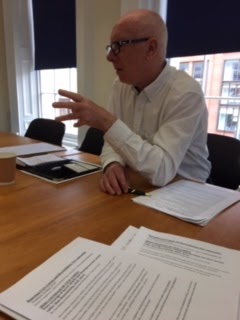Troubles victims build bridges for peace
(Dungiven, Northern Ireland)- As a peace journalism trainer, I’ve led heart wrenching conversations about reconciliation and forgiveness in conflict zones like Kashmir and South Sudan. Yet in no place I’ve traveled Is the pain of conflict, and the threat of violence, so close to the surface as it is here in Northern Ireland.
Conflict induced pain, and the hope for a more harmonious future, were on display at an event Sunday night in Dungiven titled “Having Difficult Conversations.” The panel discussion was organized in conjunction with Lyra’s Walk (see link below), held to honor the memory of journalist Lyra Mckee, who was killed during a protest in April in Derry.
Six panelists discussed their experiences during and after the Troubles (link below). Especially inspirational were panelists Jo Berry and Richard Moore, both of whom suffered incalculable loss during the Troubles yet have overcome bitterness and hatred to lead peace movements.
Berry’s father was killed by an IRA bomb in 1984. A few years later, she reached out to and eventually met the bomber. She said, “I didn’t need an apology...I wanted to see his humanity, that he cared.” She said that he did eventually apologize because she learned to “challenge him without making him wrong and me right.” She founded and runs an organization called Building Bridges for Peace.
Moore’s journey of forgiveness, if it appeared in a movie script, would be dismissed as implausible. At age 10, during the Troubles, he was blinded by a shot to the face by a policeman. He also met his attacker, and they have since become friends. “The greatest thing in my life is the presence of forgiveness,” he said. Moore has since gone on to launch Children in the Crossfire, which helps children in conflict zones around the world. During his travels, he met the Dalai Lama, who labeled Moore “an indomitable spirit” and “my hero.”
The best audience question at the event cut directly to the most contentious issue: Is there any point in having difficult conversations if the sides don’t want to talk? Berry said one can’t launch difficult discussions with the intent of changing opinions. Instead, she said such discussions, properly handled, can create spaces where people will feel safe if they decide to change their minds.
The discussion concluded with an examination about how Northern Ireland can move forward after Lyra Mckee’s murder as well as the long history of sectarianism here. Moore’s advice was, “You’ve got to instill compassion...You not only respond with the head, but with the heart. All groups can justify what they’ve done (during the Troubles), but we have to draw a line in the sand...and play a new game—learning from the past, but not using the past.”
Moore, Berry, and co-panelists Linda Ervine, John O’Doherty, Kathy Wolff, and Michael Culbert left me inspired and hopeful. Yet, neither I nor the other 150 attendees left wearing rose colored glasses. The historical animosities, “tribalism” as it was labeled by several panelists, were apparent in audience comments made during the event.
Even 21 years after the end of the Troubles, it’s clear that Northern Ireland’s peace is still a work in progress. But one can’t help but be encouraged after hearing the panelists tales of courage, integrity, forgiveness, and determination. If anyone can make peace happen here, it’s Jo Berry, Richard Moore, and their colleagues.
LINKS
Lyra’s Walk
The Troubles in NI-brief history





